Vegan diets can provide many health benefits and are found to be appropriate for all stages of life. That said, there are some nutrition concerns with eating a fully plant-based diet.
It’s important for vegans, or anyone eating a mostly plant-based diet, to understand the basics of proper vegan nutrition.
There are many nutrition myths spread by both vegans and non-vegans. Often, these myths stem from people wanting to make a vegan diet look ideal or harmful. The truth is usually somewhere in the middle.
Jump to:
Always speak with a doctor before changing your diet or taking new supplements. Please read our full website disclaimer.

What is a Vegan Diet?
A vegan diet is any eating pattern that eliminates all animal products including meat, poultry, fish, seafood, eggs, dairy (all animal milks), honey and any products made with these ingredients.
There are many ways to follow a vegan diet, and certain diet ideologies are promoted more than others within the vegan community. There is no specific need to follow any one type of vegan diet pattern as good nutrition can be achieved in many ways.
Why Do People Follow a Vegan Diet?
Confusion surrounding vegan diets often happens because of the variety of reasons why someone may eat this way.
Most people who follow a vegan diet do so because of a commitment to veganism. Veganism is defined as:
“A way of living which seeks to exclude, as far as is possible and practical, all forms of exploitation of, and cruelty to, animals for food, clothing, or any other purpose.”
While diet is a major aspect of veganism, it also focuses on reducing harm to animals in all areas of life. It is an ethical commitment to non-humans. People who fully identify with veganism are often vegan for life.
Other people follow a vegan diet for health reasons or weight loss. These people may or may not be committed to the principles of veganism and may or may not remain vegan long-term.
Another common reason people follow a vegan diet is due to the environment impact of animal products. People concerned about the environment may not stick to a fully vegan diet for life.
The term plant-based diet is also commonly used, sometimes interchangeably with the term vegan diet. There is no specific definition of a plant-based diet; plant-based eating patterns may be fully vegan, or they may include animal products.
“Plant-based diet” is typically used for those following a plant-based eating pattern for health reasons, rather than ethics.
Health Benefits of a Vegan Diet
There are many known health benefits of vegan diets. Benefits are often related to vegan diets being high in:
These components of a vegan diet have been associated with a reduced risk of:
- Heart disease (including high cholesterol and high blood pressure)
- Type 2 diabetes/ prediabetes
- Some types of cancer
Vegan diets also tend to be lower in saturated fats, which may help explain some of the health benefits.
Vegan Nutrition: Where to Begin?
While much of this article details specific nutrients vegans should be aware of, people don’t eat nutrients, they eat foods!
Focusing on what foods to eat can be a helpful approach for beginners. I like to group vegan foods into 6 basic food groups:
- Legumes and other high protein foods: Beans, lentils and soy (including tofu, tempeh and soy milk) are good sources of protein on a vegan diet. They also contain nutrients like fiber, iron and zinc. Other high protein foods, like seitan or mock meat products, can fit into this food group as well.
- Grains and other high carbohydrate foods: Whole grains are a great staple for vegan diets and offer healthy carbohydrates along with fiber, B-vitamins, iron, zinc and some plant-based protein. Other high-carbohydrate foods, like starchy vegetables, can fit into this category but don’t offer as much of these nutrients.
- Nuts, seeds and other healthy fats: Don’t shy away from healthy fats as they are an important part of a balanced diet. Nuts, seeds, avocados and soy foods are great sources of fat on a vegan diet. Certain cooking oils can also fit into this food group and support a balanced diet.
- Vegetables: There’s a wide array of vegetables to choose from and variety is key as different vegetables offer different nutrients. Some are high in calcium, B-vitamins, vitamin A, vitamin K, vitamin C, fiber and antioxidants.
- Fruits: While often grouped together with vegetables, I like to keep fruits separate to put a focus on vegetables. While less nutrient dense than vegetables, fruits provide nutrition including vitamin C, fiber and sometimes vitamin A.
- Herbs, spices and other flavors: Some people view vegan food as bland and boring. I like to consider herbs, spices and other flavorings (vinegar, sauces, condiments) as a food group to encourage creativity and help people enjoy their vegan meals!
Eating legumes/protein, grains and vegetables, along with nuts/seeds/healthy fat and fruits, is a good starting place for adequate nutrition on a vegan diet.
Important Nutrients for Vegan Nutrition
While vegan diets can be healthful, there are nutrients vegans should be aware of to plan for a balanced diet.
For beginners, this list may seem overwhelming. Many nutrients can be found in the same foods, which is why focusing on food groups (outlined above) can be a helpful starting place.
Below is a brief overview of each critical nutrient for vegans to consider. Detailed, fully referenced posts are linked in each section for further reading.
Nutrients that are important for vegan health include:
- Protein
- Vitamin B12
- Vitamin D
- Omega-3s
- Other fats
- Calcium
- Iron
- Zinc
- Iodine
- Vitamin A and Beta Carotene
- Vitamin K
- Selenium
Protein
The number one question about vegan nutrition seems to be “where do vegans get their protein”?
The answer is quite simple: there’s an abundance of protein in plant-based foods.
Legumes and soy tend to provide the most protein. Some high-protein legumes and soy products to include in a vegan diet are:
- Beans (black, navy, chickpeas, etc.)
- Lentils (all types)
- Soy (including tofu, tempeh, soy milk, TVP, soy curls, edamame)
- Certain mock meat products
Seitan is also a very high protein food that many vegans enjoy. It’s made from wheat protein, so not a legume, but it’s a tasty choice.
Grains, nuts and seeds also offer plant-based protein. Higher-protein choices include:
- Peanuts
- Almonds
- Pistachios
- Hemp seeds
- Pumpkin seeds
- Quinoa
- Oats/ oatmeal
Lastly, there are small amounts of protein in vegetables. Sometimes people overstate the amount of protein in vegetables, which remains quite small compared to the foods above. Some higher protein vegetables are:
- Green peas
- Corn
- Mushrooms
- Kale
- Broccoli
Consuming protein throughout the day is a great way to ensure adequate intake.
A common problem many new vegans make, regarding protein, is replacing meat with vegetables in certain recipes. There are many recipes that feature mushrooms, eggplant, cauliflower or jackfruit as the main protein; but these foods are low in protein.
Occasionally eating lower protein meals should be okay if higher protein foods (legumes, soy, nuts, seeds, grains) are also eaten regularly.
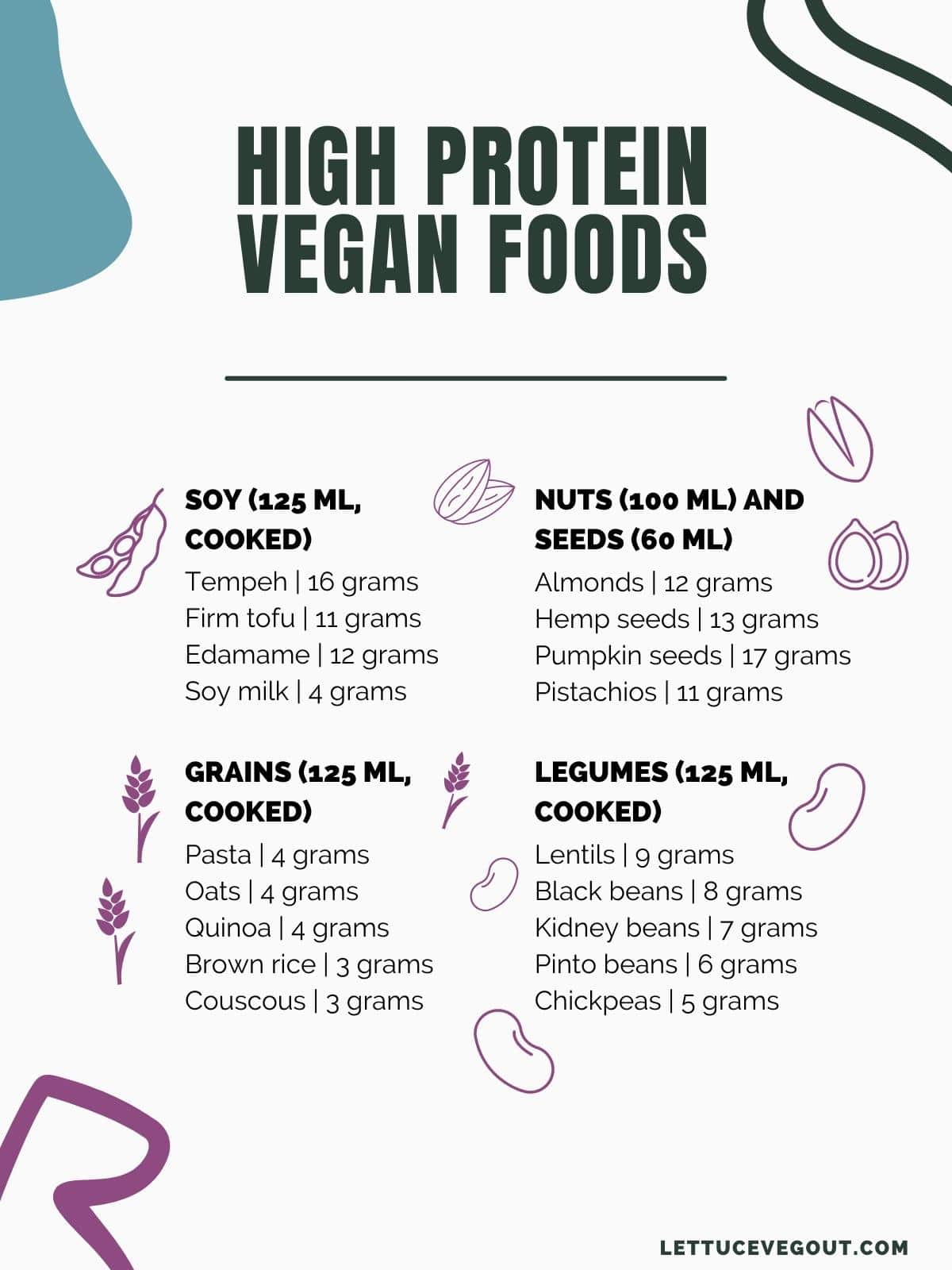
Vitamin B12
Vitamin B12 is a nutrient of concern for vegan diets because there are no reliable sources of B12 in plant-based foods.
There are claims that B12 is naturally present in numerous vegan foods, but these claims have not been supported with adequate research.
This is an area where vegans require supplementation (or must consume adequate amounts of fortified foods).
Vitamin B12 deficiency can be very harmful, but you can avoid negative impacts with inexpensive supplements.
Research on vitamin B12 supplements is almost entirely based on cyanocobalamin. Recently, many supplements on the market have begun using methlycobalamin instead.
Most (if not all) supplement recommendations for vegans reference cyanocobalamin. The amount of methylcobalamin needed to meet vitamin B12 needs is not well established.
It’s thought that humans need significantly more methlycobalamin to adequately meet vitamin B12 needs.
Most vegan nutrition experts recommend cyanocobalamin supplements in one of two ways:
- 25-100 micrograms daily OR
- 1000 micrograms twice per week
There are other possible B12 supplement regimes. Always speak to your primary care provider before starting new supplements.
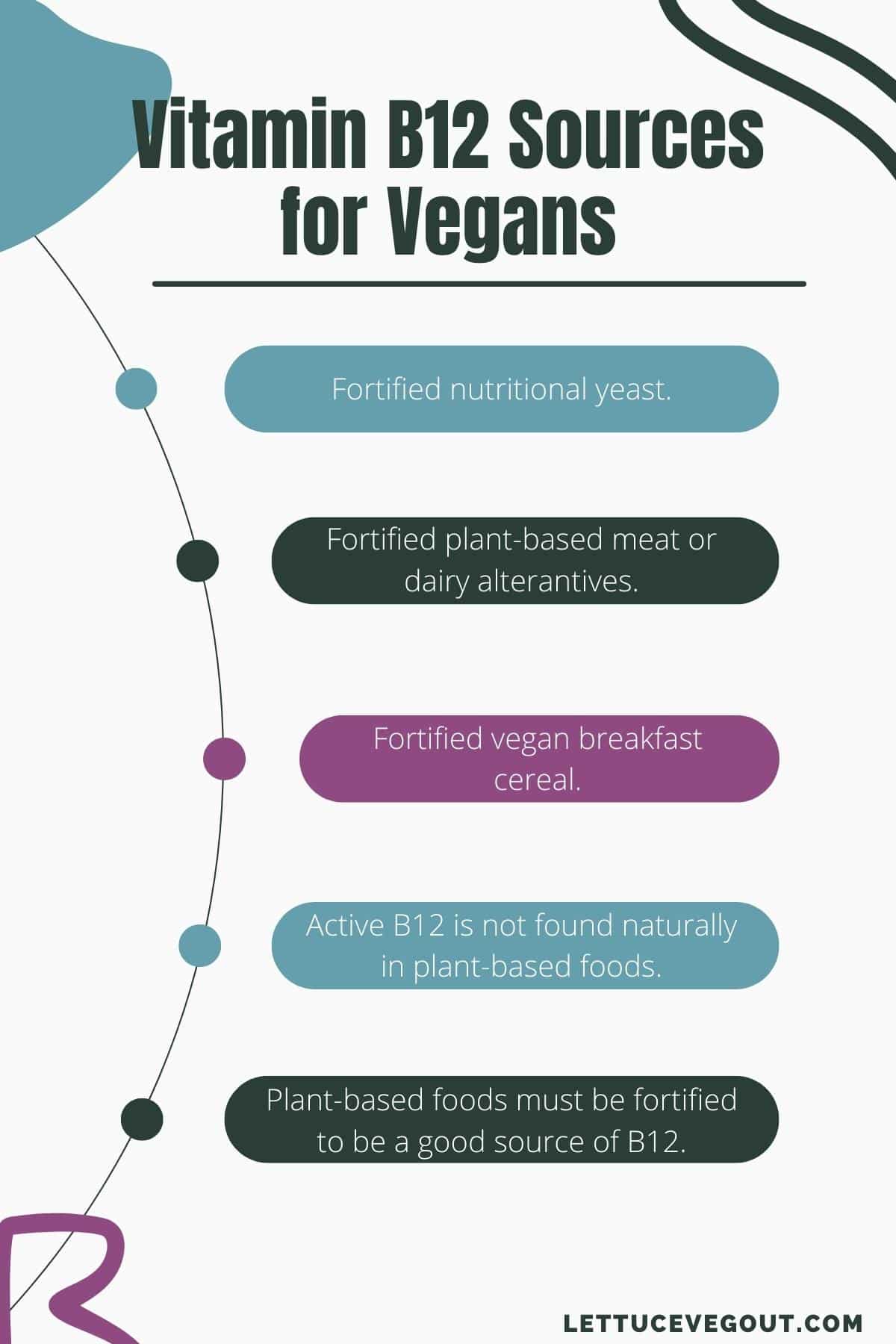
Vitamin D
Vitamin D is an essential nutrient that’s lacking in food, vegan or otherwise. It’s an interesting nutrient because humans can produce vitamin D when skin is exposed to sunlight.
However, with modern lifestyles (working inside most of the time), and for other factors (skin cancer concerns, sunscreen use, modest clothing, smog, skin tone), getting adequate sun exposure is not practical for many people.
In the winter months, those at high latitudes are especially prone to low vitamin D levels. The sunlight in winter is not strong enough to produce vitamin D (plus it’s often too cold to expose skin).
With age, skin loses its ability to produce vitamin D too.
There are 3 ways to get enough vitamin D:
- Expose skin to sunlight (balancing risk of skin cancer and other limiting factors)
- Eat fortified foods (if not fortified, vegan foods do not contain vitamin D)
- Take a vitamin D supplement
Certain health authorities recommend vitamin D supplements during the winter months. Older adults may also benefit from consuming vitamin D supplements year-round.
Vegans likely need to supplement with vitamin D unless they can ensure adequate sun exposure and/or consume plenty of fortified foods.
Mushrooms are not a good source of vitamin D unless they’ve been irradiated, a practice of exposing mushrooms to ultraviolet light, which is not standard in many places.
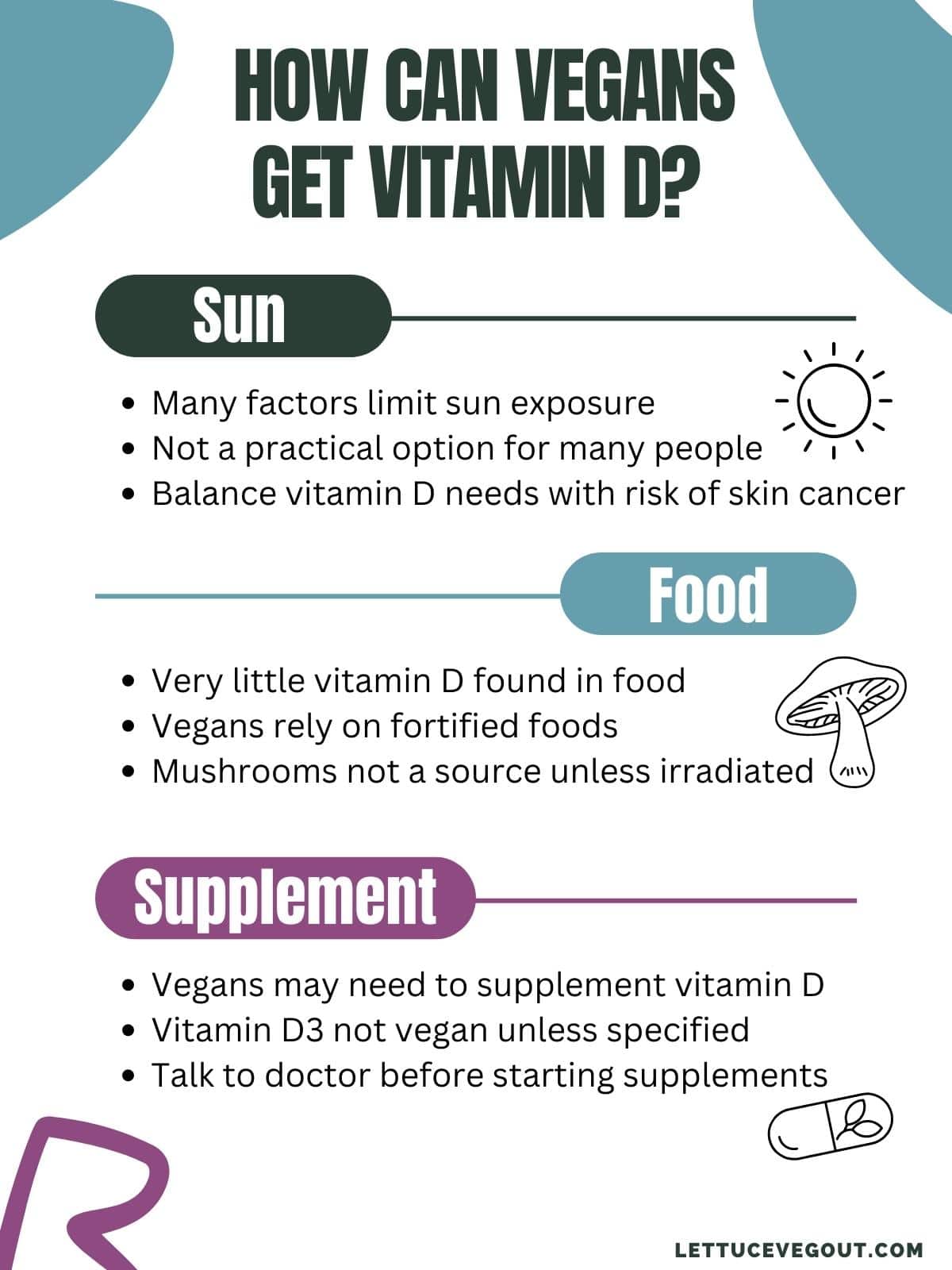
Omega-3s
Omega-3s are an essential nutrient. There are 3 types of omega-3s important for human health, including ALA, EPA and DHA.
Currently, only ALA is considered essential and has established intake recommendations. Certain plant-based foods are a very good source of ALA, including:
- Ground flaxseed and flaxseed oil
- Hemp seeds and hemp oil
- Chia seeds
- Walnuts and walnut oil
- Soybeans (including edamame) and soybean oil
Some other plant-based foods contain smaller amounts of omega-3 ALA:
- Beans (especially kidney and navy beans)
- Wheat germ
- Pumpkin seeds
- Brussels sprouts
- Spinach and kale
Meeting ALA needs as a vegan shouldn’t be challenging if foods from the lists above are regularly consumed.
The body can convert ALA into EPA and then DHA, but not in large amounts. Some researchers believe DHA should be considered an essential nutrient on its own, as it has unique health benefits and is thought to be essential during pregnancy, lactation and infancy.
For those concerned about consuming adequate DHA, there are vegan DHA supplements available. Always speak with your primary healthcare provider before starting any new supplements.
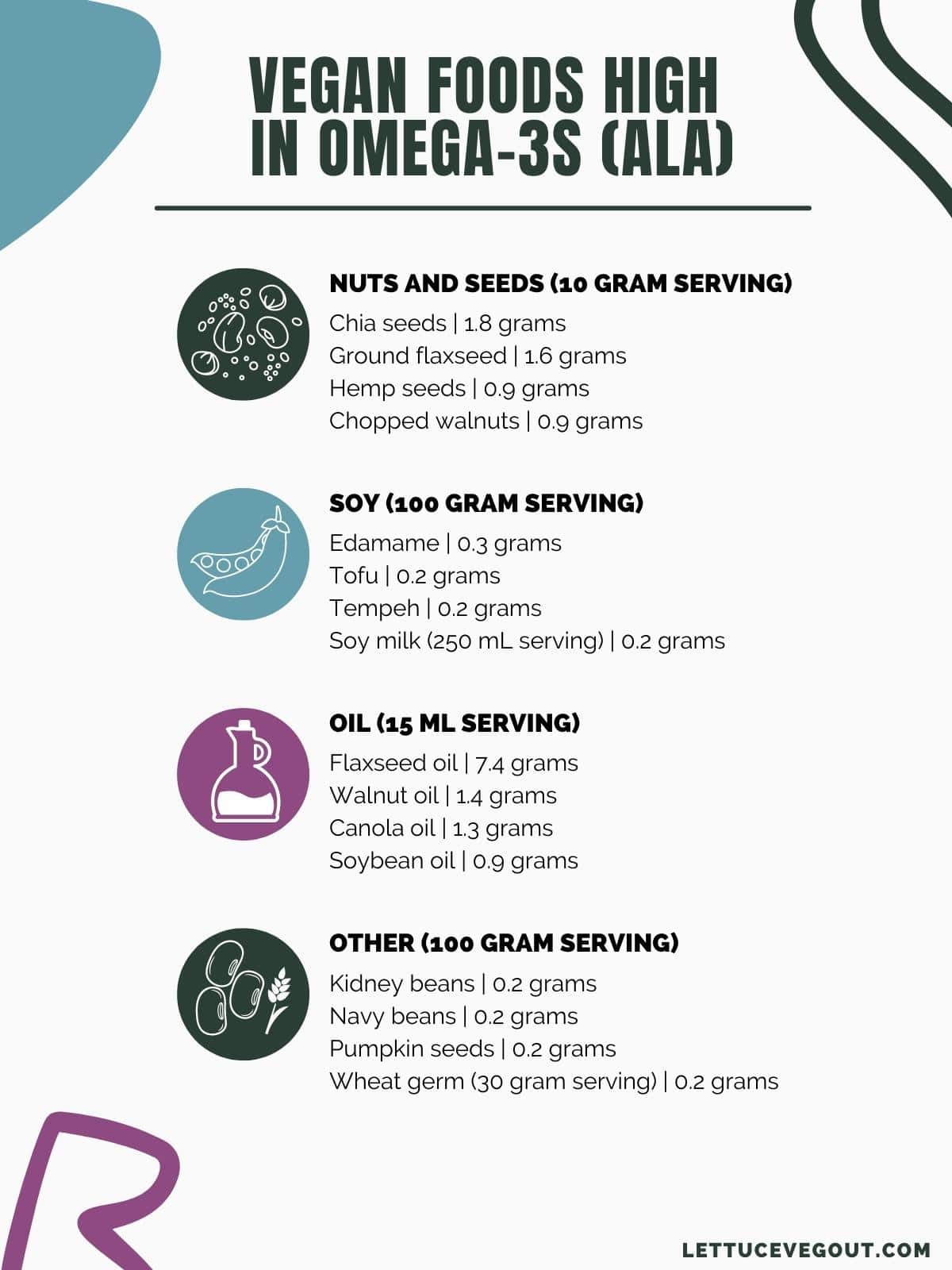
Other Fats
Low fat or very-low fat diets are commonly promoted within the vegan/plant-based community. There are many ways to consume a healthful diet and limiting fat is not necessary for most people.
Some people enjoy this way of eating but many others do not. Strict oil free diets are also not needed for a balanced vegan diet.
For those interested in a vegan diet for life, moderate fat intake may make this lifestyle change more sustainable and enjoyable.
Calcium
In my opinion, calcium is one of the more challenging nutrients to consume enough of on a vegan diet. This is largely because intake recommendations are quite high.
Outdated advice claims that vegans don’t require as much calcium as meat eaters, but this idea is not supported by current research. It’s prudent for vegans to meet basic intake recommendations set out for the general public.
Absorption of calcium from plant-based foods is an important consideration. Many high-calcium foods, like spinach, are also high in a compound called oxalate.
Oxalate binds to calcium and prevents it from being absorbed. This is an important factor when deciding if a food is a good source of calcium.
Vegan foods high in absorbable calcium include:
- Fortified dairy alternatives (with 20-30% of daily needs per serving considered a good source)
- Calcium-set tofu (ingredient list should include “calcium”)
- Cooked, low-oxalate leafy greens including Bok choy, kale, mustard greens, turnip greens, broccoli, Romaine lettuce and Brussels sprouts
2-3 cups each day of the foods listed above should provide a good base-level of daily calcium intake.
Other plant-based foods contain calcium in smaller amounts. These other foods will round-out intake requirements when eaten in addition to foods high in calcium.
Lower calcium plant-based foods include:
- Beans, especially white beans
- Almonds
- Tahini (and sesame seeds)
- Chia seeds
- Poppy seeds
- Okra
- Butternut squash
- Sweet potato
- Molasses (especially blackstrap)
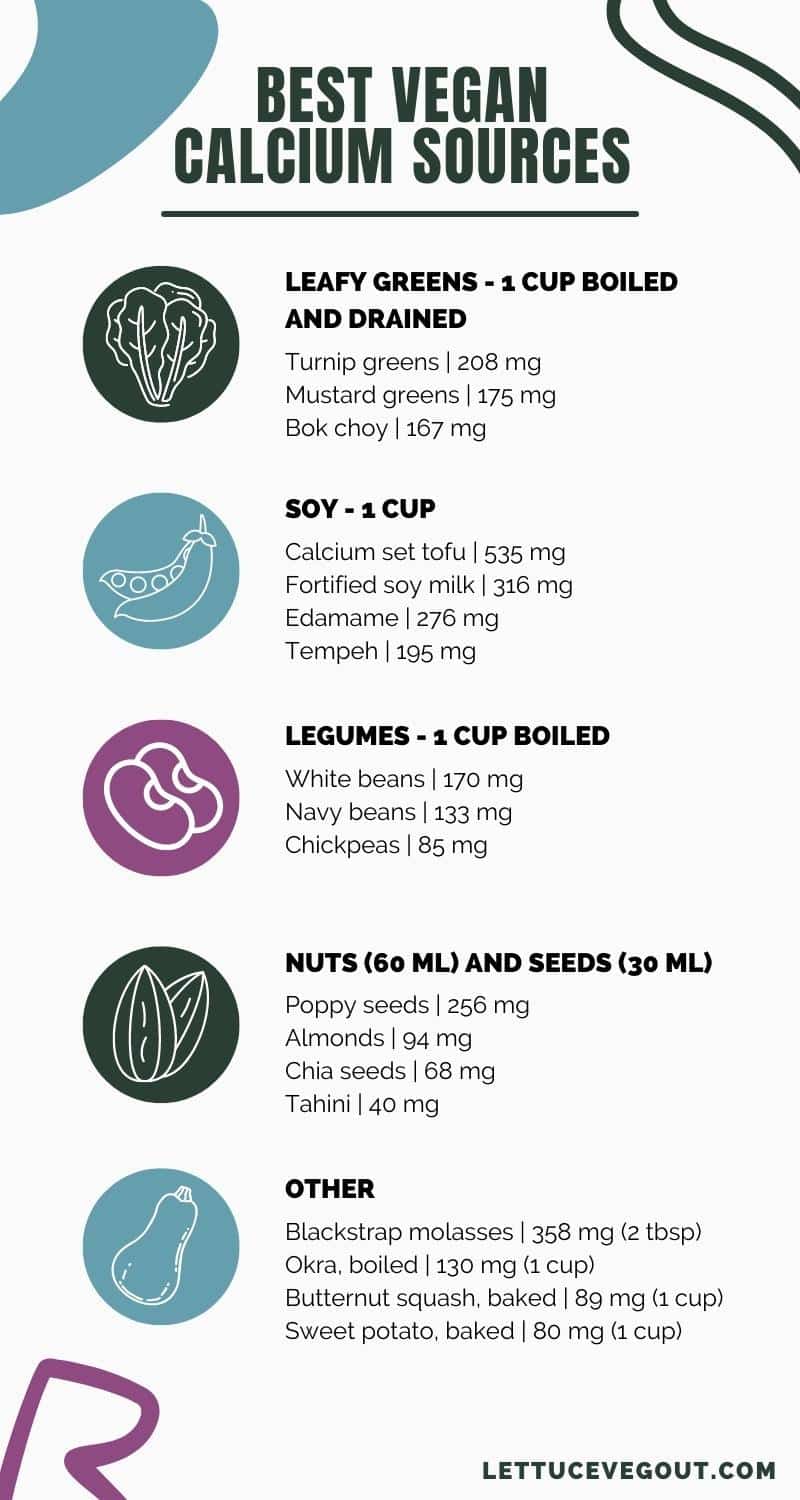
Iron
Iron is an essential nutrient that supports many bodily functions. Deficiency is common, especially for those with a menstrual cycle, which makes iron a priority nutrient when it comes to vegan diets.
It’s thought that vegans require higher amounts of iron because iron is more challenging to absorb from plant-based foods.
While it’s true that plant-based iron is absorbed less, there are ways to increase iron absorption from plant foods. The easiest way to do this is adding a source of vitamin C to any meal containing iron.
Vitamin C is found in vegetables and fruits (to varying amounts).
Avoiding calcium supplements, coffee and tea with meals may also help iron absorption.
Vegan foods high in iron include:
- Beans (chickpeas, black beans, navy beans, etc.)
- Lentils
- Soy including tofu, tempeh, edamame
- Seeds
- Nuts
- Whole grains (plus refined grains if they’ve been fortified)
Some vegetables, dried fruits and other foods like dark chocolate also contain smaller amounts of iron.
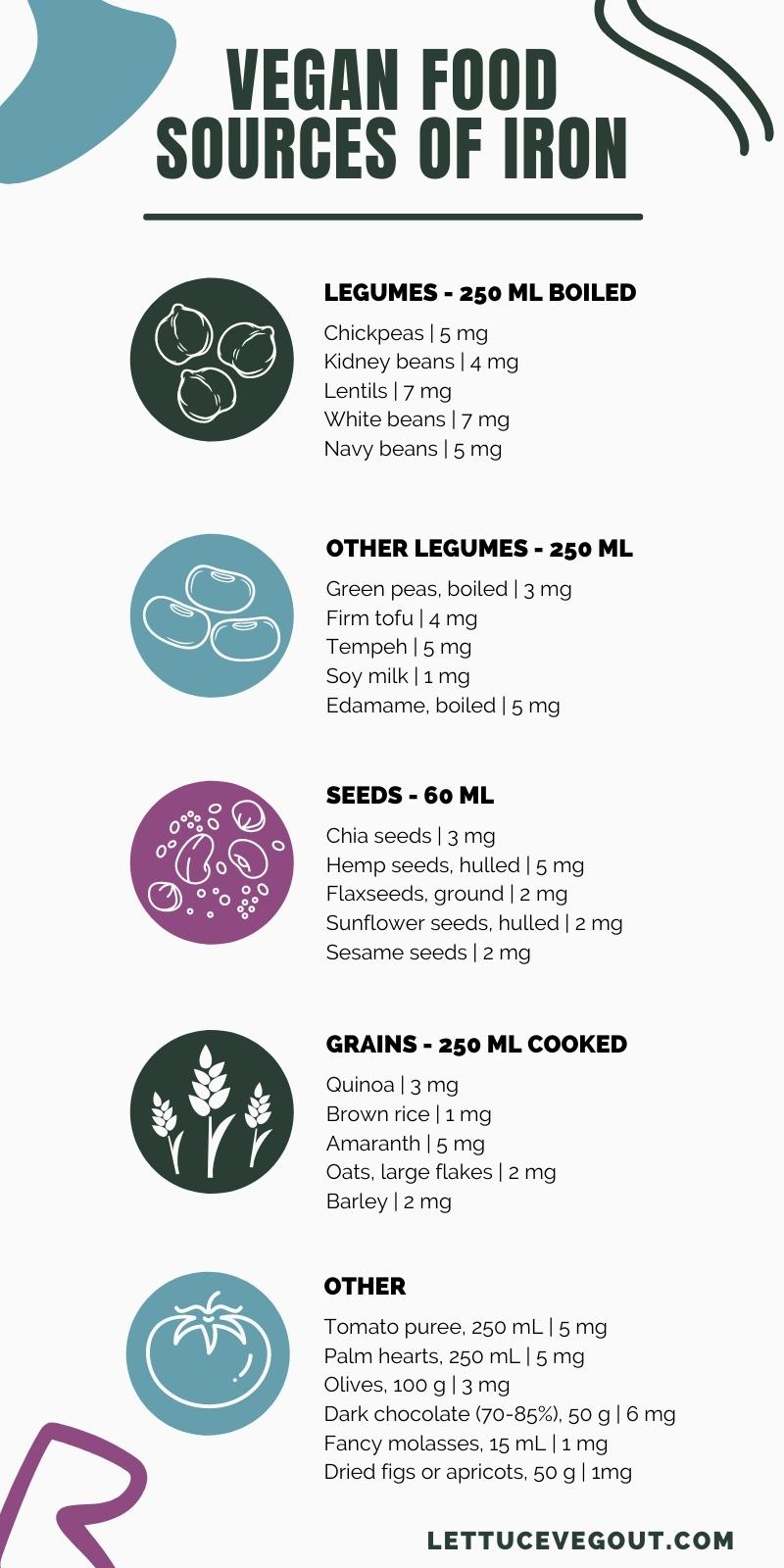
Zinc
Compared to iron, zinc is a more challenging mineral to consume for many vegans.
Plant-based foods contain smaller amounts of zinc, and absorption of plant-based zinc is a concern.
Improving the absorption of zinc can be tricky. Sprouting foods, soaking and fermenting them are ways to improve zinc absorption.
Zinc is found in much of the same foods as iron, mainly legumes (beans, lentils, soy), whole grains, seeds and nuts (seeds often contain more zinc than nuts).
When considering zinc, whole grains are best because most refined grains lose a large amount of their zinc. While fortifying refined grains with iron is common in many countries, zinc is often not fortified back into grain products.
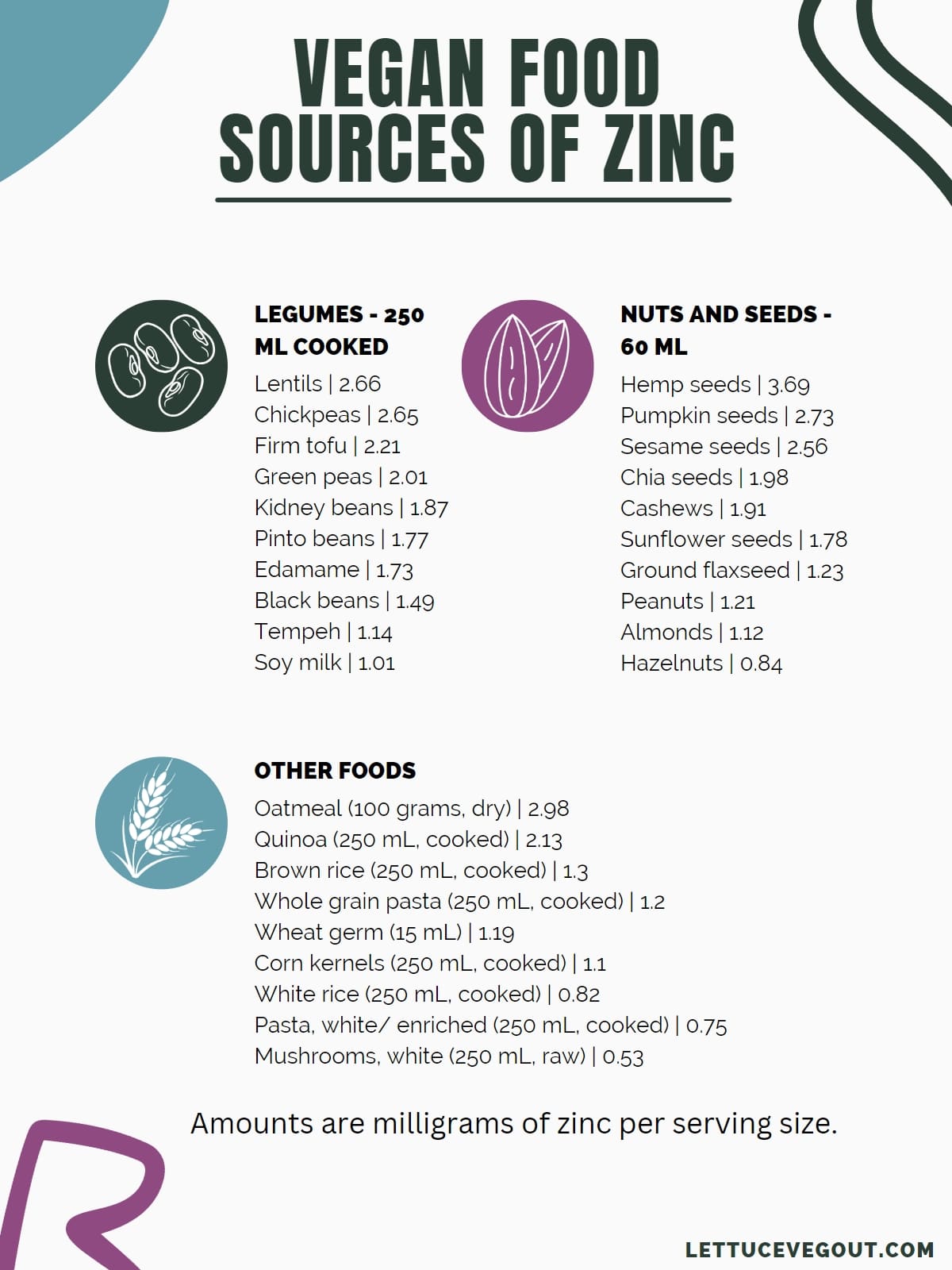
Iodine
Many people have never considered iodine intake, but it may be a concern for vegans.
Iodine can be present in vegetables, but only if grown in iodine-rich soil (which often is not the case).
Iodized salt is the main way most people consume iodine (apart from dairy products and seafood but those aren’t available to vegans). Alternative salts, like sea salt and pink salt, don’t contain iodine (unless the label specifies “iodized”) and vegans may run into issues with low intake if they consume these instead of iodized salt.
Processed or packaged foods typically do not use iodized salt, even though they contribute greatly to salt intake for the general population.
Seaweed or other sea vegetables are often promoted as a good source of iodine for vegans. While these foods contain iodine, the amounts vary and there may be excessively high levels (which isn’t good either). It’s difficult to know if you’re getting to much, too little, or achieve any type of consistent intake.
The most reliable way for vegans to ensure adequate iodine intake is with iodized salt.
A half teaspoon of iodized salt is enough to meet the daily iodine needs of most people. This amount of salt should keep sodium intake under recommended levels.
Taking an iodine supplement is another option for those who don’t want to use iodized salt. Speak with your primary care provider before starting any new supplements.
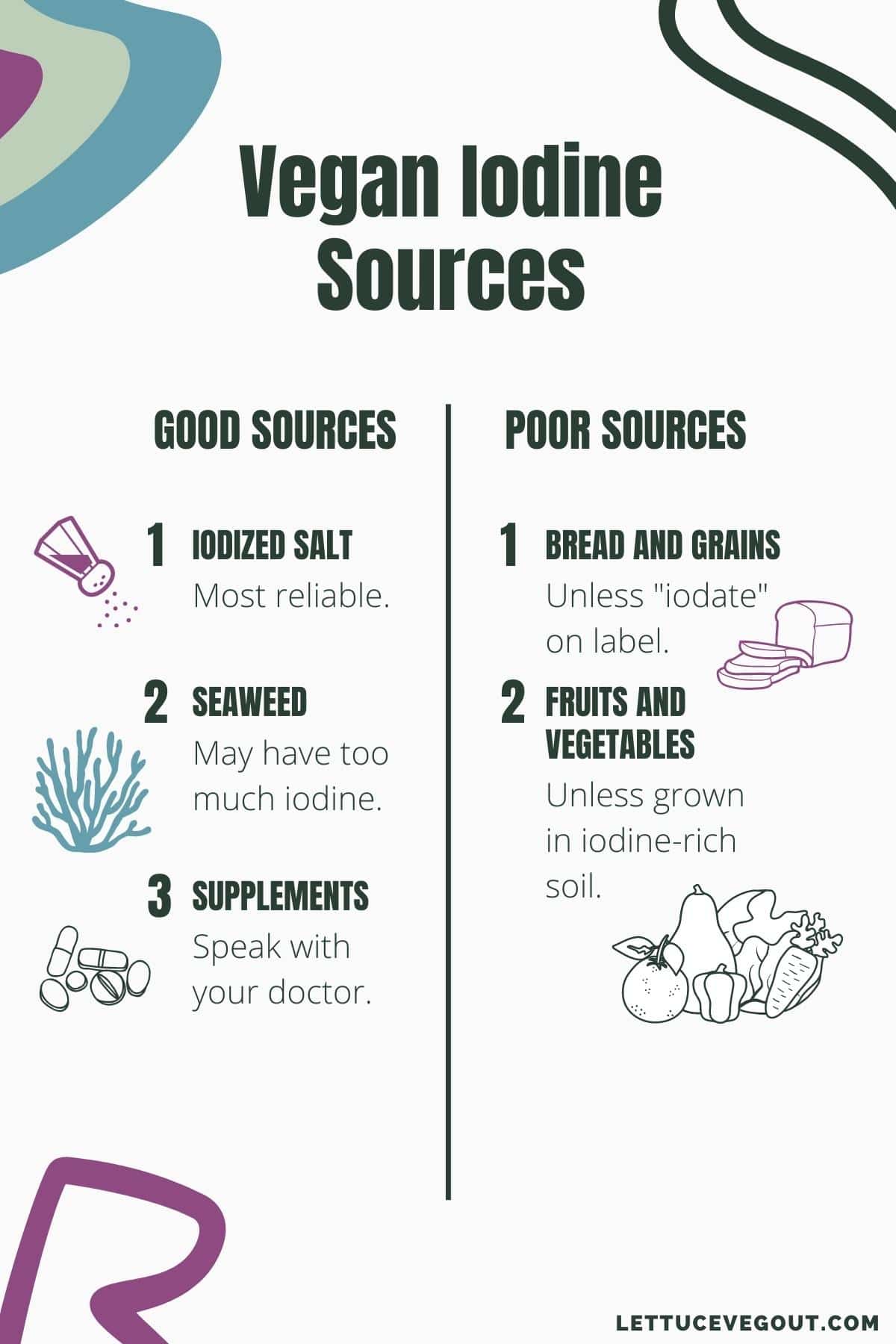
Vitamin A and Beta Carotene
Vitamin A is an essential nutrient that’s only found in its “pre-formed” or “active” state in animal foods.
Instead of active vitamin A, vegans rely on beta carotene, which the body must then convert.
There are plant-based foods that provide a good source of beta carotene. It’s found mainly in vegetables, especially dark green and orange vegetables. Some orange-colored fruits also offer beta carotene.
Vegan foods high in beta carotene include:
- Sweet potato
- Pumpkin
- Carrots and carrot juice
- Squash
- Spinach
- Collard greens
- Cantaloupe
- Red bell peppers
- Broccoli
- Dried apricots
Consuming at least one, but more likely 2-3 servings of dark green or orange vegetables/ fruits each day can help vegans meet intake requirements for vitamin A (in the form of beta carotene).
Some vegan foods may be fortified with pre-formed vitamin A as well and this can contribute to intake requirements.
Vitamin A is fat-soluble and is better absorbed when a source of fat is included in the meal.
Vitamin K
Vitamin K is an essential nutrient found in plant-based foods that often isn’t considered a concern for vegans.
There are two types of vitamin K: K1 and K2.
Traditional nutrition recommendations only focus on vitamin K1 as it’s the form of vitamin K with established roles in the body. Intake recommendations do not differentiate between K1 and K2.
Vitamin K1 is found in high amounts in leafy green vegetables. By eating greens, vegans can meet vitamin K requirements.
Some people raise concerns about vegan diets because, while they can easily meet intake recommendations for vitamin K1, they lack vitamin K2. Natto, a fermented soy food, is the only good vegan source of vitamin K2.
Recent research suggests vitamin K2 might play a role in human health. There are no established intake recommendations for vitamin K2, but some people believe it should be considered a separate essential nutrient.
Vegans can use vitamin K2 supplements if, after speaking with their doctor, they deem its a concern.
Selenium
Lastly, selenium is a nutrient that’s sometimes considered a concern for vegans.
Selenium is present in plant-based foods, but like iodine, the amount in a food highly depends on the soil it was grown in.
Grain products tend to offer the most selenium, followed by soy products, legumes and certain nuts and seeds.
Brazil nuts are a highly concentrated source of selenium. Just a couple Brazil nuts per week can meet selenium intake requirements.
I jokingly refer to Brazil nuts as “selenium supplements” since they offer such high amounts. If you’re concerned about selenium intake, consider adding 2-3 Brazil nuts to your weekly meals.
Put it Together for Good Vegan Nutrition
Hopefully you noticed a pattern with the foods listed being good sources of nutrients.
Legumes, whole grains, nuts, seeds and vegetables (particularly leafy greens and orange vegetables) offer much of the nutrition you’ll need on a vegan diet.
Along with a vitamin B12 supplement, and possibly vitamin D supplement, vegans can consistently meet their nutrient needs.
Always speak to your primary care provider before starting any new supplements.
Here’s an article summarizing vegan supplement recommendations. Learning how to meal plan for a balanced vegan diet may also be very helpful!
Some people promote overly restrictive vegan diets that often eliminate processed foods. Processed foods can be tasty, convenient and add flavor to vegan meals. They may also offer extra nutrients and can help people enjoy a balanced life.
Adding layers of restriction to a vegan diet makes meeting nutrient needs more challenging and can lead to people not sticking to veganism for the long-term.
Eating in a way that’s joyful and satisfying while meeting nutrient needs sets vegans up for lifelong success. This often includes plenty of whole foods, and some more processed options on occasion.
Nutrition Tips for New Vegans
Some helpful tips when transitioning to a vegan diet are:
- There’s no such thing as a perfect vegan diet. Find what works for you and enjoy it!
- Mistakes happen and there’s no need to worry if you accidently buy or eat something that isn’t vegan.
- Transitioning to a vegan diet can take time and doesn’t need to happen overnight. Starting small is very helpful for lots of people.
- Some vegans can be judgmental; ignore these people. You’re doing your best and that’s more than good enough.
- Eat enough food. Vegan foods are often high in fiber and can fill you up quickly; getting enough calories, protein and other nutrients is important to keep energy levels up and you feeling your best.
- Learn how to cook. Even if you don’t enjoy cooking, or don’t have much time to cook, learning the basics can be extremely helpful.
- Don’t avoid supplements. Vegans need a vitamin B12 supplement at the very least; other supplements may be helpful as well.
- Enjoy fun foods. Just because you’re vegan now, doesn’t mean you need to “give up” any of the foods you previously enjoyed. Almost any recipe can be veganized!
- Remember that veganism is about the animals. Keeping these ethical principles in mind can be helpful.
Always speak with a doctor before changing your diet or taking new supplements. Please read our full website disclaimer.
Additional Resources and Reading
This is a very long article and likely a good starting point for most people. If you have interest in learning more about vegan nutrition, check out my latest nutrition articles!
There are other essential nutrients not discussed above. These nutrients shouldn’t be a concern for vegan diets, but you may be interested in reading about:
And here are some other topics of interest:
- Why vegans should eat leafy greens
- Fake meat: What does a dietitian think about meat alternatives?
- Bloating on a vegan diet: How long does bloating last when becoming vegan?
- Legumes are bad for you? What you need to know
- Are grains bad for you? Gluten, lectins and carbohydrates
Summary: Vegan Diets
There are many health benefits of a vegan diet, but some nutrients may be challenging for vegans to consume enough of.
Meeting nutrient needs is possible with the help of supplements, plenty of legumes, whole grains, vegetables, nuts, seeds and fruits. Other processed foods can also be part of a balanced vegan diet.
Veganism is focused on reducing harm to animals. While people follow vegan diets for other reasons, at its core, veganism is about ethics. Those who aren’t committed to the principles of veganism are far less likely to maintain this way of living long-term.
To learn more about each nutrient, with fully referenced research included, click a linked full-length post on that topic.

About Nicole Stevens
Nicole is a long-time vegan with a Masters of Science in Food and Nutrition.
She helps people thrive on a vegan diet with balanced recipes.
